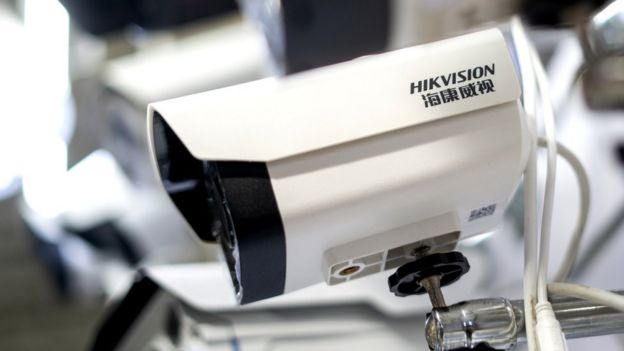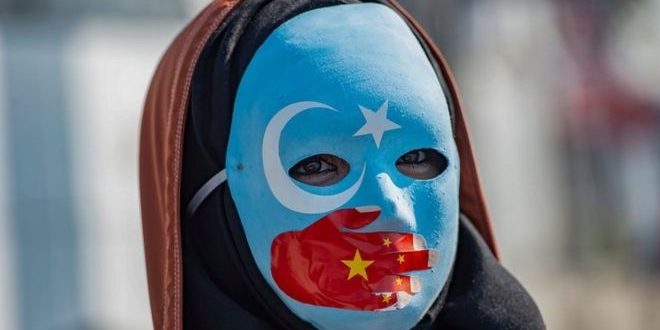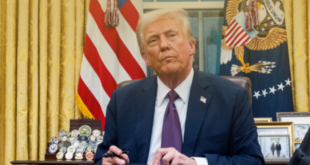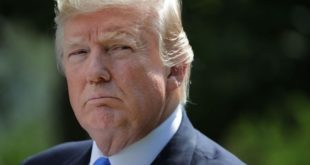The US has blacklisted 28 Chinese organisations for their alleged involvement in abuses against ethnic Uighurs in China’s Xinjiang province.
The organisations are now on the so-called Entity List, which bars them from buying products from US companies without approval from Washington.
The 28 targets include both government agencies and technology companies specialising in surveillance equipment.
It is not the first time the US has put Chinese groups under a trade ban.
In May, the Trump administration added telecommunications giant Huawei to the Entity List because of security fears over its products.
A Commerce Department filing said the organisations are “implicated in human rights violations and abuses”.
Rights groups say Beijing is severely persecuting the mostly Muslim Uighurs in detention camps. China calls these “vocational training centres” to combat extremism.

Who has the US targeted?
The Commerce Department said in its decision on Monday that these 28 entities are implicated in “China’s campaign of repression, mass arbitrary detention, and high-technology surveillance against Uighurs, Kazakhs, and other members of Muslim minority groups.”
Xinjiang province’s Public Security Bureau is on the list, along with 19 other smaller government agencies.
Hikvision, Dahua Technology and Megvii Technology are among eight commercial groups on the list, all of which specialise in facial-recognition technology.
Hikvision is one of the largest surveillance equipment manufacturers in the world.

The US and China are currently in the midst of a trade war, and have sent delegations to Washington for a meeting about the tensions later this week.
Targeting China’s AI stars
By Karishma Vaswani, BBC Asia Business correspondent
This move by the US will no doubt hurt China’s technology ambitions, at least in the short term.
The companies targeted are some of China’s biggest tech stars in artificial intelligence – the industry China is staking its future on.
But the components used in AI algorithm training are currently only made by American firms like Intel, Movidius and Nvidia.
Increasingly, though, US moves to restrict the American tech available to Chinese companies is prompting China Inc to accelerate its desire for self-sufficiency.
For instance, after Huawei was placed on the US entity list earlier this year – which meant that companies like Google would need to get an export license from Washington before selling to it – the Chinese company said it would start developing its own operating software to embed on its phones.
Chinese alternatives to other US technology are also being developed.
As the US and China’s trade war turns increasingly into a battle over technology, consumers will eventually have to choose between all-Chinese and all-American product
What is the situation in Xinjiang?
China has launched a massive security operation in Xinjiang, in its far west, in recent years.
Human rights groups and the UN say China has rounded up and detained more than a million Uighurs and other ethnic minorities in vast detention camps, where they are forced to renounce Islam, speak only in Mandarin Chinese and learn obedience to the communist government.
China says those people are attending “vocational training centres” which are giving them jobs and helping them integrate into Chinese society, in the name of preventing terrorism.

There have been increasingly vocal denunciations from the US and other countries about China’s actions in Xinjiang.
Last week, US Secretary of State Mike Pompeo alleged that China “demands its citizens worship government, not God” in a press conference in the Vatican.
And in July more than 20 countries at the UN Human Rights Council signed a joint letter criticising China’s treatment of the Uighurs and other Muslims.
Who are the Uighurs?
Uighurs are ethnically Turkic Muslims. They make up about 45% of the Xinjiang region’s population; 40% are Han Chinese.
China re-established control in 1949 after crushing short-lived state of East Turkestan.
Since then, there has been large-scale immigration of Han Chinese and Uighurs fear erosion of their culture.
Xinjiang is officially designated an autonomous region within China, like Tibet to its south.
BBC
 Home Of Ghana News Ghana News, Entertainment And More
Home Of Ghana News Ghana News, Entertainment And More





